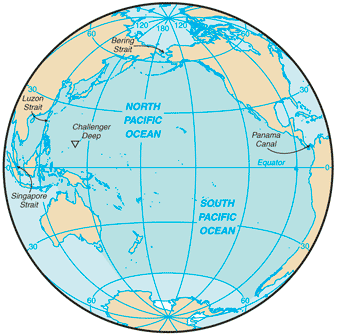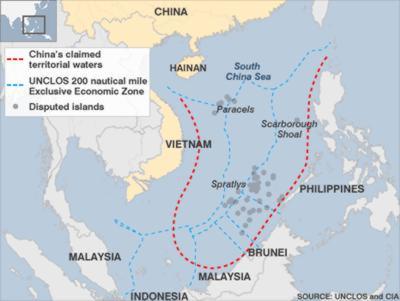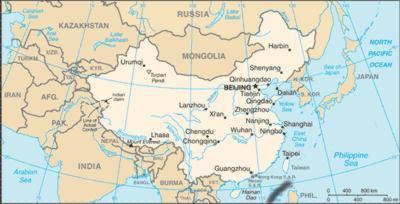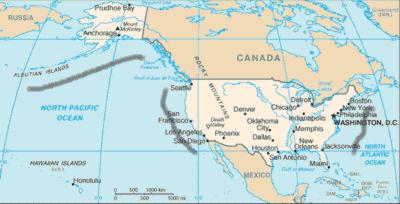More recently, China's leaders have apparently decided that catching up with countries that use market-oriented economies is more important than ideological purity. That, I think, is good news. Particularly for folks living in China.
What doesn't seem to have changed so much is a parochial set of assumptions about China and foreigners.2 In my opinion.
Which brings me to something I read in the news this morning:
Vietnam, China, Fishing Boats, and Live Ammo
Chinese leaders are under the impression that they own the South China Sea, as far south as Brunei. That doesn't include a narrow line of water on the western shores of the Philippines, or a somewhat wider strip off the Vietnamese shore.Most of the rest of the world - including the United States - recognize national economic boundaries as a strip of ocean 200 nautical miles wide. That boundary was set by the United Nations Conference on the Law of the Sea (UNCLOS). Maybe you heard that the running dog capitalist oppressors hadn't ratified UNCLOS. Ratified, no: recognize, yes.3
Vietnam seems to think it's okay to operate within its UNCLOS boundaries.
Which brings me to something I read this morning:
"Vietnam plans live-fire drill amid South China Sea row"From that point on, the BBC News piece gives detail about what may be a sort of 'he said/she said' snit on an international scale. China claims that one of their poor, helpless fishing boats was cruelly dragged for an hour by the uncaring Vietnamese. Not in quite those terms - but I gather that China's claiming to be the victim here.
BBC News (June 10, 2011)
"Vietnam has said it will hold live-fire exercises in the South China Sea amid escalating tensions with China over disputed waters.
"Vietnam warned vessels to stay out of the area off its central coast when it conducts the drills on Monday.
"It follows a verbal clash with China over sovereignty in the area.
"China reacted angrily after Vietnam said a Chinese fishing boat rammed cables from an oil exploration vessel inside its exclusive economic zone.
"Beijing said Chinese fishing boats were chased away by armed Vietnamese ships in the incident on Thursday...."
They may be right.
Or, maybe not.
I don't know.
I'm no greater fan of Vietnam's current leadership, than I am of China's. Although Vietnam's bosses also seem to have realized that their old-school economic policies simply weren't working.4 And that's another topic.
Vietnam and China in a Snit: So What?
The South China Sea isn't quite as far away from Minnesota as you can get from Minnesota, and still be on Earth - but it's close. In the 'good old days,' I might never have heard of the altercation between Vietnam and China.This isn't the 'good old days.' And even then it might have made a difference to folks here in central North America. Particularly if the folks running China and Vietnam decide to let what happened grow into a shooting war.
I don't know how likely an armed confrontation is - but I am pretty sure that China's leadership has decided to get China back to the top of the heap in world affairs.
I don't have a problem with China returning to the prosperity and cultural achievements of its past - with upgrades. From my point of view, that means more markets for American producers - and maybe more tourists in Minnesota's lake country.
What I am concerned about is the possibility that China's leaders may not quite realize what century they're at - and that quite a few folks now think it's impolite to march an army into somebody else's territory and say that you've 'liberated' it.
There are some who think getting a little empire to call your own is still okay, of course. And that's yet another topic.5
Related posts:
- China
- "China and Google: 'Shut Up Or We'll Hurt You' "
(June 6, 2011) - "China, Paper on How to Bring Down USA Power Grid: All a Big Misunderstanding?"
(March 20, 2010) - "China Shot 12: Don't Worry, They're 'Mobsters' "
(July 19, 2009) - "Chinese Anti-Carrier Missile: Cause for Concern"
(March 31, 2009) - "Forget the Olympics For Now: China's Secret Submarine Base is Serious"
(May 2, 2008)
- "China and Google: 'Shut Up Or We'll Hurt You' "
- Living in the Information Age
- "France and Online Social Media: Dealing With E-Mail and Other Threats"
(June 6, 2011) - "L-3 Communications, Grumman: Hack Attack"
(June 1, 2011) - "Pentagon's New(ish) Policy About Hack Attacks"
(May 31, 2011) - "Lockheed Martin, Oak Ridge, Spear Phishing, and Common Sense"
(May 29, 2011) - "Lockheed Martin Corp, SecureIDs, EMC, and All That"
(May 28, 2011)
- "France and Online Social Media: Dealing With E-Mail and Other Threats"
- "Vietnam plans live-fire drill amid South China Sea row"
BBC News (June 10, 2011)
1 "China," CIA World Factbook (last updated May 26, 2011)
2 I've discussed what China seems to believe, before:
- "Gmail, China, Knee-Jerk Response, and the Information Age"
(June 4, 2011) - " 'Everybody Knows' That Americans are Arrogant"
(February 17, 2010)
Note:
"...Although the United States now recognizes the UNCLOS as a codification of customary international law, it has not yet ratified it...."4 "Vietnam," CIA World Factbook (last updated June 7, 2011)
(United States non-ratification of the UNCLOS," Wikipedia) [emphasis mine]
5 Yankee imperialism, real or imagined, still seems to be anathema in American academia. There seems to be a little sympathy for the 'right sort' wanting little empires to call their own, though:
- "'Quagmire's' Back: Georgia, Russia, NATO, Bush, and the Blame Game"
(August 24, 2008)
Particularly- Russian Imperialism is Okay?!
- Anonymous comment of August 28, 2008
Pacific Ocean

(Pacific, CIA World Factbook, used w/o permission)
South China Sea, disputed boundaries

(BBC News, UNCLOS, CIA, used w/o permission)
China

(China, CIA World Factbook, used w/o permission)
I added the approximate South China Sea UNCLOS boundary to the CIA World Factbook map.
United States - UNCLOS

(United States, CIA World Factbook, used w/o permission)
For comparison, I added the approximate UNCLOS boundary to this map of the United States. America is in the happy position of having two of the planet's largest oceans on its two major coasts. The east and west coasts both face other nations: but they're thousands of miles away.
United States - Outer Continental Shelf (OCS) boundary

(ary 05, 2010 - Arguments About the Arctic Heat Up As the Ice Melts, UC Santa Barbara Geography / News & Events / Department News, used w/o permission)
This map is an illustration of another sort of politico-economic boundary involving the United States. It's part of a standard-issue piece on the 'global warming gonna kill us all' theme - but I think the map is a useful illustration for comparing American boundary issues and China's.
Additional background:
- CIA World Factbook
- "Pacific Ocean"
(last updated November 17, 2010) - "United States"
(last updated June 6, 2011)
- "Pacific Ocean"

No comments:
Post a Comment